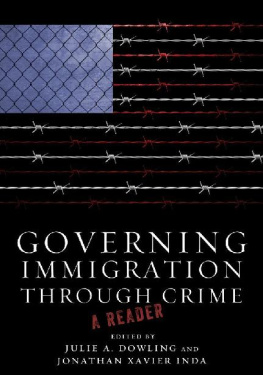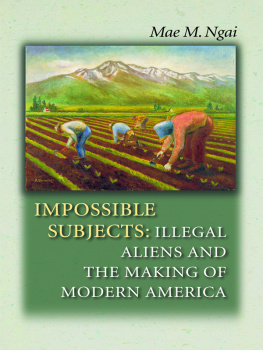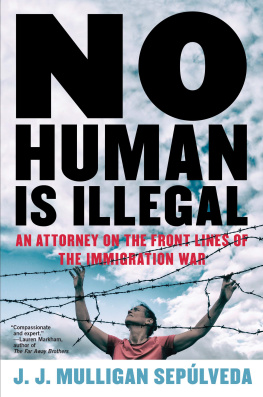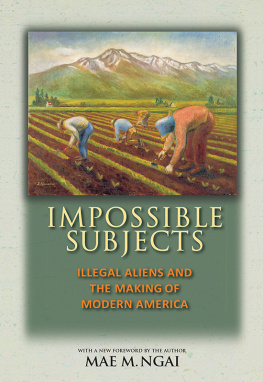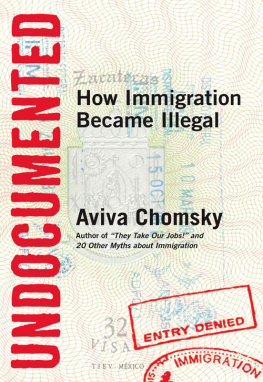Foreword 2013 by Rev. Dennis H. Holtschneider, C.M. 2011, 2013 by Marie Friedmann Marquardt, Timothy J. Steigenga, Philip J. Williams, and Manuel A. Vsquez No part of this book may be reproduced, in any form, without written permission from the publisher.
Requests for permission to reproduce selections from this book should be mailed to:
Permissions Department, The New Press,
120 Wall Street, 31st floor, New York, NY 10005.
First published in the United States by The New Press, New York, 2011 This paperback edition published by The New Press, 2013
Distributed by Two Rivers Distribution
ISBN 978-1-59558-901-9 (e-book)
LIBRARY OF CONGRESS CATALOGING-IN-PUBLICATION DATA
Living illegal : the human face of unauthorized immigration/Marie Friedmann Marquardt... [et al.].
p. cm.
Includes bibliographical references and index.
1. Illegal aliensUnited States. 2. United States Emigration and immigrationSocial aspects. I. Marquardt, Marie F. 1972JV6475.L58 2011
The New Press publishes books that promote and enrich public discussion and understanding of the issues vital to our democracy and to a more equitable world. These books are made possible by the enthusiasm of our readers; the support of a committed group of donors, large and small; the collaboration of our many partners in the independent media and the not-for-profit sector; booksellers, who often hand-sell New Press books; librarians; and above all by our authors.
www.thenewpress.com
Composition by dix! This book was set in Walbaum
2 4 6 8 10 9 7 5 3 1
At DePaul University, where I am president, a bright student approached us two years ago in desperate need of help after finding herself in a terrible bind. The studentI will call her Juliahad been the salutatorian of her high school class and kept up the good work after coming to DePaul, earning a very high grade-point average and taking a variety of leadership positions in student organizations. Working when possible, Julia also volunteered to help the poor every week. She was the type of student we prize: a high achiever who is engaged in our community and contributes to society.
By many accounts, Julias life was flourishing, except for one important aspect: she was an unauthorized immigrant. This meant she was unable to qualify for federal scholarship funds, federally backed loans, or DePauls work-study program. Her educational funds were quickly depleting. Charity, along with the few private scholarships that DePaul was able to find for her, could not compensate for her shortfall of funds. Unable to pay her tuition, this young womans life began to crumble, all because she was born on the wrong side of a border in a country she did not knowshe had spent all but the first few months of her life in the United States.
A graduate student Ill call Ahmed first wrote me to beg that I help him become eligible to accept a job offer from a major U.S. firm. I was unable to do so, and, following his education at DePaul in finance and information technology, he returned to a Pakistan he never knew. Ahmed had gone to high school here. He has a Chicago accent and a brilliant mind, and wants nothing more than to work and build a life in this country. Numerous employers desperately wanted his combination of skills, but the United States limit on employment-based green cards each year could not accommodate him or the many businesses who cannot find sufficient U.S. citizens to apply for these positions. Although Ahmed introduced himself to distant relatives to try to build a life in Pakistan, he has finally found a more welcome reception in Canada and will soon move there.
Because the legal issues surrounding immigration are complex, it is easy to lose sight of the human element in the debates over policy and border enforcement. Unauthorized immigrants celebrate birthdays, care for their families, start businesses, worry about money, and, yes, go to college, like anyone else. The authors of Living Illegal illustrate this dilemmahuman and ordinary lives juxtaposed against the fear of discrimination and deportation. This very real depiction of living illegal in America is a side of the issue very few contemplate and is precisely why I selected the book for the DePaul Presidents Book Club.
Living Illegal lays bare the realities of unauthorized immigrants living in our midst and demonstrates what happens to peoples lives when politics cloud smart social choices. The stories detailed in these pages are heartbreaking, but not surprising. Unauthorized immigrants come to the United States for the same reasons many of our own ancestors boarded boats to make the perilous trip from Europe, Cuba, or Asia. They are fleeing political oppression, seeking a steady paycheck to support their families, or searching for a better quality of life. They worry constantly about being deported over something as simple as not having a drivers license.
The conundrums described in Living Illegal show why the issue of unauthorized immigration merits closer attention. Few people realize that common misconceptions about the socioeconomic value of unauthorized immigrants are fed by government policies. For instance, take the issue faced by students such as Julia. The federal government makes financial aid available to young people with the idea that this aid is an affordable, short-term investment that eventually turns students into contributing taxpayers. Yet the government withholds that assistance from unauthorized immigrants, making it extremely difficult for them to attend college. Now consider the often-heard complaint that unauthorized immigrants are long-term financial drains on society and ask, What is the governments better investment: short-term financial aid for college with a longer-term yield of tax revenues or years of welfare, health care, or lower to no tax revenues because most of these unauthorized immigrants will obtain only low-paying jobs without a college education?
DePauls stance on immigration is rooted in the words and actions of our namesake, St. Vincent de Paul, who, in his day, shaped Frances approach to the overwhelming postwar influx of the rural poor into urban Paris. We admit students regardless of their citizenship and thus have no way of knowing exactly how many of our students are unauthorized immigrants. Typically, we learn about these students when they reach a breaking point in their lives, as with Julia and Ahmed. Their college funding dries up, perhaps because a parent has lost a job or their savings have been depleted. Sometimes we are able to find other avenues to assist them so they can continue their educations. Often we cannot. We help them because they are human beings who have every right to pursue the same dreams our ancestors not only dreamed but also realized.
Throughout history, society has confronted a fear of incorporating the stranger. The United States justified slavery and Jim Crow by claiming those of African descent were less than human. Women were portrayed as too simple-minded and emotionally unstable to vote. Hitler fanned fears that Jews were plotting the overthrow of German society. Today, entire classes of unauthorized immigrants have been demonized by unfair portrayals of immigrants perceived negative effects on the United States economy, crime rate, and social order. The benefits of their influence are rarely brought to light, let alone discussed. Rarely do we hear stories about the contributions unauthorized immigrants make to small businesses, industries, churches, or once-failing neighborhoods.


